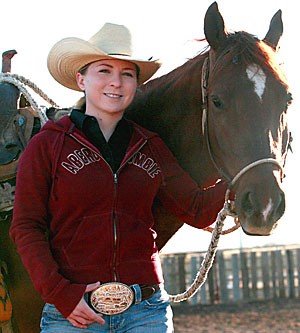Seven years ago, Heather Raftery experienced the birth of her baby. She fell in love instantly and knew from that moment, her future was changed.
Like most new mothers, Raftery believed her child would one day be a champion – and she was right.
The only difference is, Raftery’s baby is a horse.
“”He is a part of me, I raised him,”” Raftery said of her horse Sbydwr, pronounced “”Spider.””
“”He is like my kid. I know his personality. I know what he hates and what he likes … I think that does factor into how well we do. He wants to do well for me and I want to do well for him.””
Raftery, a journalism and anthropology senior, and Sbydwr won seventh place at the National Cutting Horse Association World Finals in Amarillo, Texas. She also recevied the title of “”Show Champion,”” meaning she won the most money at the event.
Cutting horses is a sport where Western riders separate particular cows from a herd of cattle, Raftery said. The practice originated in the Old West, when cowboys had to gather and “”cut”” a cow out from the rest of the herd to brand it or give it medical treatment.
Over time, cutting developed into a competition. The sport is judged on two conditions: the riders control over the cow and the horse’s performance during the competition.
Raftery, who has been riding horses her whole life, began competing when she was 12 years old and is coached by her father.
“”My father didn’t want me to start cutting until I was mentally able to really understand the concept of the sport,”” Raftery said.
The sport requires concentration and athleticism, she said.
“”The horse is moving super-fast so you have to be very balanced,”” Raftery said. “”Because you can’t use your hands once the cow is singled out, the rider has to be able to give the horse signals from their feet.””
In the competition, the rider tries to separate the cow of their choice from the herd in 2 1/2 minutes.
“”You want to choose one that isn’t fearful and isn’t dull, you want a cow with movement to show off your horse’s stamina,”” Raftery said.
“”He is like my kid. I know his personality. I know what he hates and what he likes.””
– Heather Raftery,
senior majoring in journalism and
anthropology
Once the cow is cut, the horse has to take direction from the rider’s feet. The horse’s job is to prevent the cow from getting back to the herd by mirroring the cow’s actions, Raftery said.
“”If the cow goes one way, the horse has to go in the same direction and stop the cow,”” Raftery said.
As a child, Raftery said she was trained for seven years by her father. He would pedal on a bicycle with flag attached. The flag’s erratic movements mimicked how a cow would behave in an arena, which taught Raftery how to ride around it.
Meanwhile, Sbydwr spent four years training with real cows that were borrowed from Raftery’s family friends.
About 540 riders participated in this year’s world championship, which is divided into 12 classes.
Raftery competed in the “”3,000 novice-non-professional”” category, meaning she is not a professional rider nor has her horse won more than $3,000 since Jan. 2006.
Countries represented at the National Cutting Horse Association World Finals included Canada, Italy, Germany, Australia and the U.S.
“”Going into the competition, I wasn’t expecting anything at all,”” said Raftery, who won $4,300 at the finals. “”I had so much fun last year that I didn’t really care what I did out there. I was just so thrilled to death that Sbydwr and I were working so well together.””
Raftery said she will try to reimburse her parents for the entry fees with her winnings, but she is trying to save up to purchase a house.
“”My ultimate goal is to buy a little place with a green pasture, where Sbydwr will retire for the rest of his life,”” Raftery said.









